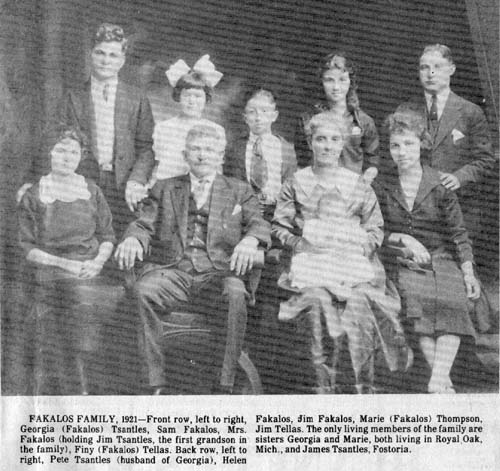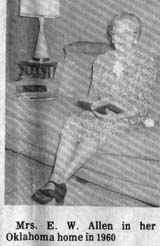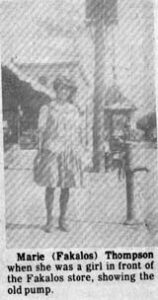February 2, 1978



Picture #1 – Fakalos Family – 1921 – Front row, left to right, Georgia (Fakalos) Tsantles, Sam Fakalos, Mrs. Fakalos (holding Jim Tsantles, the first grandson in the family), Finy (Fakalos) Tellas. Back row, left to right, Pete Tsantles, (husband of Georgia), Helen Fakalos, Jim Fakalos, Marie (Fakalos) Thompson, Jim Tellas. The only living members of the family are sisters Georgia and Marie, both living in Royal Oak, Michigan, and James Tsantles, Fostoria.
Picture #2 – Mrs. E.W. Allen in her Oklahoma home in 1960
Picture #3 – Marie (Fakalos) Thompson when she was a girl in front of the Fakalos store, showing the old pump.
Today’s story is one I started to write a year ago. One aspect of it developed another, and before I knew it I had written to California in search for a photo…written to one of the principles in the story now living in Detroit…and interviewed another also living in Detroit. All this before I was able to bring together all the data and photos.
The principals in the story are Mrs. E.W. Allen, known to older Fostorians as Blanche Crockett, who once was a teacher in Fostoria schools, before her marriage to E.W. Allen…the Presbyterian church…and the Fakalos family.
Mrs. Allen was a fine lady, and a devout Christian, who believed in the Great Commission “Go ye forth into all the world…” as taught in the Christian Bible. And she put it into practice.
She was active in missionary society work at the local Presbyterian church, during the times when Rev. E.C. Pires and Br. F.A. Wilbur were pastors…but she didn’t let it stop there.
She continually reached out into the community to bring into the Sunday School and church those who were unchurched, or anyone who thought or needed the Christian influence.
Fostoria had a Chinese laundry in those days, at 309 S. Main…where the Sportsman Shop is now located. Men had their shirts done there, but especially their white detachable collars. The two Chinese who operated the laundry became the subjects of Mrs. Allen’s missionary endeavors and soon were brought to the Presbyterian Sunday School.
The children of the Sam Fakalos family also fell under the watchful eye of Mrs. Allen. The family was of Greek origin and belonged to the Greek Orthodix Church in their native country, but there was none close by. Allen saw to it that the Fakalos children were enrolled in the Presbyterian Sunday School too, and they became faithful attendants for many years.
Fifty years or more, hadn’t dimmed my memory of the principals of this story as I started to prepare it, and as it progressed many fond memories were once again relived, as I looked at the old photos, and talked to descendants of the Sam Fakalos family.
Mrs. E.W. Allen passed away a few years ago in Oklahoma. The accompanying photo was taken in 1960. Clara (Allen) Swedenborg, sent the photo to be shortly before her death in 1977.
I remember, vividly Mr. and Mrs. Sam Fakalos, and daughters Marie, Helen and Georgia. Georgia later married Pete Tsantles, the parents of James Tsantles who grew up and still lives in Fostoria.
Pete Tsantles was a Fostoria business man here for many years. He was associated with Jim Tellas in the Palm restaurant, and owned the Hays Hotel at the time it was destroyed by fire.
The accompanying photos will bring back memories for older Fostorians…and acquaint younger readers with interesting aspects of by gone days in this city.
I was privileged to renew acquaintanceship with Georgia (Fakalos) Tsantles, when she visited in her son’s home…Jim. Incidentally, as Jim grew to the proper age, his aunts Marie and Helen took him to Sunday School too…and today he continued his membership in the Presbyterian Church and is an elder.
Georgia explained that her father Sam Fakalos came to the U.S. with his brother from Greece in 1907, and initially stayed with one of his countrymen who was living in Tiffin. After two years he returned to see his family and brought them back with him. The family visited for awhile with friends in Fostoria, then settled in Tiffin in 1910. In 1918 they moved to Fostoria and bought the business at the corner of Main and North from another Greek family who had established it.
Fostorians will remember is as the frame structure that was attached to the brick building still in existence; where the ceramics store is now. Perhaps six feet wide and thirty fee long…mostly enclosed by glass…it provided a good livelihood for the Fakalos family.
Freshly popped corn…hot peanuts in the shells…a variety of fruit…candy. ..cigars, were a few of the items dispensed. This seemingly small business provided an income to raise the family and establish themselves as “well liked” in our community.
Georgia remembers she was only seven when her parents brought her to the U.S. and that she had the flu during the epidemic that swept the country in 1918. She remembers a Greek wedding party held in the Moose Hall when it was on the third floor of the Alcott building. “I had a pair of new shoes…and the dance floor was slick…oh, what fun I had sliding all over it…no one could catch me”, she said. The building referred to was located where the merchants parking lot is now at Main and Center.
Georgia reminded me of the old pump that was at the curb in front of the Fakalos business and shown by one of the accompanying photos.
Initially, the family lived in the rooms above the present ceramic shop. Access was gained to the living quarters by an outside, covered stairway; the doorway is still visible to the second floor entrance.
In later years the Fakalos family owned and lived in the house on Sandusky Street at Potter, shown in one of the accompanying photos.
Sam Fakalos sold his corner business to Pete Dongas in 1936 and they moved to Bellevue for a few years…then on to Detroit in 1938, where married daughters then resided.
As I look back 50 years or more years, I am reminded that Fostoria had the ingredients for an International Club, the same as exists today in many cities. There were Greeks, Chinese, Syrians, Germans, Belgiums, Italians, and French all living here, and contributing to the social economic and religious environment of that day.